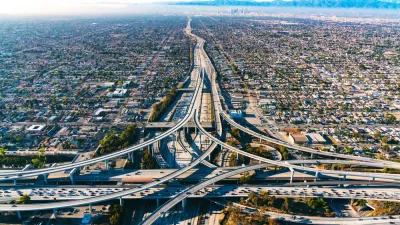Sprawl leads to more emissions, but the economic costs are also high. Policies and strategies that ensure compact growth are essential.

Catlyne Haddaoui considers the implications of an August 2018 report from The New Climate Economy that says more sustainable, compact urban development will lead to global economic savings of up to $17 trillion by 2050. “Compact cities produce fewer emissions because they tend to offer better access to public transit and cycling and walking paths, have greater energy efficiency, have lower environmental costs for infrastructure, and allow for more green spaces.”
She reports that infrastructure is less costly to build and maintain in compact cities, and residents in these cities do not have to travel as far or deal with congestion and air pollution, which then boosts GDP. In addition, says Haddaoui, compact cities bring people together, spur innovation, and increase productivity.
Strategies for compact growth need to stop sprawl, which promotes auto dependence, single-family homes, and low-density development. Haddaoui says shifting people from driving to sustainable modes of travel is crucial, and this change will happen through transportation infrastructure investments.
She adds that these investments need to be coupled with national policies that further support compact development. “Governments will need to reform spatial plans, building codes and tax incentives to discourage sprawl. And they’ll need to do this while avoiding the displacement of low-income or other marginalized urban residents as inner-city areas become more attractive,” says Haddaoui.
FULL STORY: Cities Can Save $17 Trillion by Preventing Urban Sprawl

Planetizen Federal Action Tracker
A weekly monitor of how Trump’s orders and actions are impacting planners and planning in America.

Congressman Proposes Bill to Rename DC Metro “Trump Train”
The Make Autorail Great Again Act would withhold federal funding to the system until the Washington Metropolitan Area Transit Authority (WMATA), rebrands as the Washington Metropolitan Authority for Greater Access (WMAGA).

The Simple Legislative Tool Transforming Vacant Downtowns
In California, Michigan and Georgia, an easy win is bringing dollars — and delight — back to city centers.

The States Losing Rural Delivery Rooms at an Alarming Pace
In some states, as few as 9% of rural hospitals still deliver babies. As a result, rising pre-term births, no adequate pre-term care and "harrowing" close calls are a growing reality.

The Small South Asian Republic Going all in on EVs
Thanks to one simple policy change less than five years ago, 65% of new cars in this Himalayan country are now electric.

DC Backpedals on Bike Lane Protection, Swaps Barriers for Paint
Citing aesthetic concerns, the city is removing the concrete barriers and flexposts that once separated Arizona Avenue cyclists from motor vehicles.
Urban Design for Planners 1: Software Tools
This six-course series explores essential urban design concepts using open source software and equips planners with the tools they need to participate fully in the urban design process.
Planning for Universal Design
Learn the tools for implementing Universal Design in planning regulations.
Smith Gee Studio
City of Charlotte
City of Camden Redevelopment Agency
City of Astoria
Transportation Research & Education Center (TREC) at Portland State University
US High Speed Rail Association
City of Camden Redevelopment Agency
Municipality of Princeton (NJ)





























